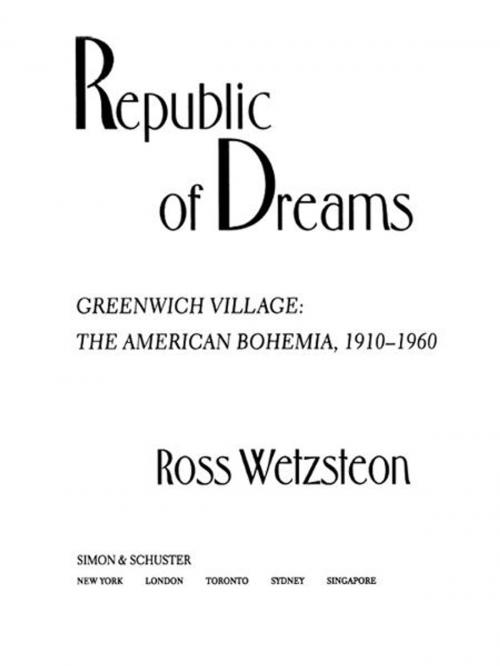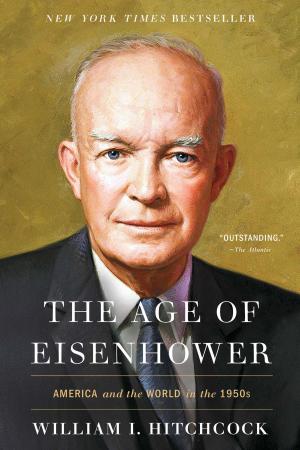Republic of Dreams
Greenwich Village: The American Bohemia, 1910-1960
Fiction & Literature, Anthologies, Nonfiction, History| Author: | Ross Wetzsteon | ISBN: | 9781416589518 |
| Publisher: | Simon & Schuster | Publication: | November 1, 2007 |
| Imprint: | Simon & Schuster | Language: | English |
| Author: | Ross Wetzsteon |
| ISBN: | 9781416589518 |
| Publisher: | Simon & Schuster |
| Publication: | November 1, 2007 |
| Imprint: | Simon & Schuster |
| Language: | English |
If the twentieth century was the American century, it can be argued that it was more specifically the New York century, and Greenwich Village was the incubator of every important writer, artist, and political movement of the period. From the century's first decade through the era of beatniks and modern art in the 1950s and '60s, Greenwich Village was the destination for rebellious men and women who flocked there from all over the country to fulfill their artistic, political, and personal dreams. It has been called the most significant square mile in American cultural history, for it holds the story of the rise and fall of American socialism, women's suffrage, and the commercialization of the avant-garde. One Villager went so far as to say that "everything started in the Village except Prohibition," and in the 1940s, the young actress Lucille Ball said, "The Village is the greatest place in the world."
What other community could claim a spectrum ranging from Henry James to Marlon Brando, from Marcel Duchamp to Bob Dylan, from Gertrude Vanderbilt Whitney to Abbie Hoffman? The story of the Village is, in large part, the stories old Villagers have told new Villagers about former Villagers, and to tell its story is in large part to tell its legends. Republic of Dreams presents the remarkable, outrageous, often interrelated biographies of the giants of American journalism, poetry, drama, radical politics, and art who flocked to the Village for nearly half a century, among them Eugene O'Neill, whose plays were first produced by the Provincetown Players on Macdougal Street, for whom Edna St. Vincent Millay also wrote; Jackson Pollock, who moved to the Village from Wyoming in 1930 and was soon part of the group of 8th Street painters who would revolutionize Western painting; E. E. Cummings, who lived for years on Patchin Place, as did Djuna Barnes; Max Eastman, who edited the groundbreaking literary and political journal The Masses, which introduced Freud to the American public and also published Sherwood Anderson, Amy Lowell, Upton Sinclair, Maksim Gorky, and John Reed's reporting on the Russian Revolution.
Republic of Dreams is beautifully researched, outspoken, wise, hip, exuberant, a monumental, definitive history that will endure for decades to come.
If the twentieth century was the American century, it can be argued that it was more specifically the New York century, and Greenwich Village was the incubator of every important writer, artist, and political movement of the period. From the century's first decade through the era of beatniks and modern art in the 1950s and '60s, Greenwich Village was the destination for rebellious men and women who flocked there from all over the country to fulfill their artistic, political, and personal dreams. It has been called the most significant square mile in American cultural history, for it holds the story of the rise and fall of American socialism, women's suffrage, and the commercialization of the avant-garde. One Villager went so far as to say that "everything started in the Village except Prohibition," and in the 1940s, the young actress Lucille Ball said, "The Village is the greatest place in the world."
What other community could claim a spectrum ranging from Henry James to Marlon Brando, from Marcel Duchamp to Bob Dylan, from Gertrude Vanderbilt Whitney to Abbie Hoffman? The story of the Village is, in large part, the stories old Villagers have told new Villagers about former Villagers, and to tell its story is in large part to tell its legends. Republic of Dreams presents the remarkable, outrageous, often interrelated biographies of the giants of American journalism, poetry, drama, radical politics, and art who flocked to the Village for nearly half a century, among them Eugene O'Neill, whose plays were first produced by the Provincetown Players on Macdougal Street, for whom Edna St. Vincent Millay also wrote; Jackson Pollock, who moved to the Village from Wyoming in 1930 and was soon part of the group of 8th Street painters who would revolutionize Western painting; E. E. Cummings, who lived for years on Patchin Place, as did Djuna Barnes; Max Eastman, who edited the groundbreaking literary and political journal The Masses, which introduced Freud to the American public and also published Sherwood Anderson, Amy Lowell, Upton Sinclair, Maksim Gorky, and John Reed's reporting on the Russian Revolution.
Republic of Dreams is beautifully researched, outspoken, wise, hip, exuberant, a monumental, definitive history that will endure for decades to come.















